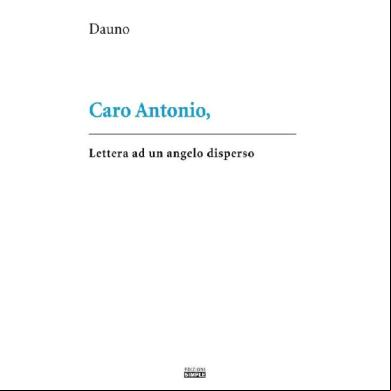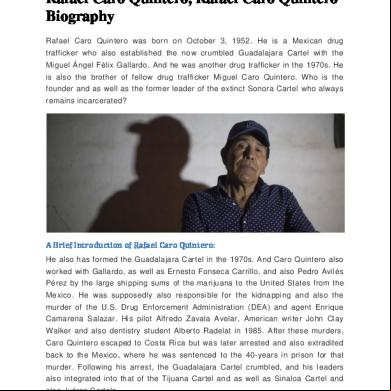Alfred Caro n466q
This document was ed by and they confirmed that they have the permission to share it. If you are author or own the copyright of this book, please report to us by using this report form. Report 445h4w
Overview 1s532p
& View Alfred Caro as PDF for free.
More details 6h715l
- Words: 517
- Pages: 2
Daniel Hamilton Mr. Neuburger English Comp 101-101 18 March 17, 2013 Survivor Summary Alfred Caro Alfred Caro was born in Zamptor, on 27 July 1911. When Hungary took over Zamptor his family moved to Berlin, . He had two brothers and three sisters. Growing up in Berlin was a great time, after training to be a butcher as a young adult, he returned to begin his adult life there. When the Nazi police began their investigations, all the men in Alfred’s family were asked to come in for questioning. Alfred hid for days but, finally he reported for questioning. The police determined that he was a Jewish man and sent him to a prison in Berlin; he was never interrogated. Soon he was sent to a concentration camp on a truck along with many other Jewish men. The building he was assigned to was called the Saxton House. Still he was never interrogated. The prison was surrounded by a tall fence and guarded by men in Nazi uniforms. Alfred recalled, “you could see there was no good in their faces”. He heard loud degrading speeches, threatening to teach the imprisoned men a lesson for living. Every morning was roll call, then to work moving sand and stone. The prisoners “had nothing but their lives, if you’re lucky, if you’re not lucky, you die”. Nazis beat the prisoners and only fed the prisoners water and a small piece of bread.
After six weeks Alfred was released. He thinks his mother ed an old friend turned Nazi to free him. Alfred went to Paris, to the French Foreign Legion and was sent to Columbia, South America. He sailed on a ship with hundreds of immigrants for two weeks. The trip was good with fine meals and wine to drink. At first he had trouble finding a job. He had to take a river boat to the gold mines for employment. He worked for a mining company that was U.S. owned. He was treated well and began to gain ground. Alfred moved to Bogota with a friend. He was able to open his own butcher shop and a restaurant. He was doing well and even found one of his sisters in Bolivia, whom he moved to Bogota to be near. In the early nineteen fifties he moved to New York to be near another sister. He found work there and prospered. While on vacation in the Catskills he met his wife. They were married and moved back to her home in Anniston Alabama. They had a daughter and owned a store together. Soon Alfred was able to open another restaurant; he is beloved locally for his cuisine. Alfred lost his mother, father, two brothers, and a sister to the Nazis but he survived and is very proud of his family, heritage, and his religion. He is not a hateful person and was awarded a huge minora, from his hometown Christian friends, which hang above his local Synagog. He has went back to once and says it’s not the same; “I will never forget and will never forgive”.
After six weeks Alfred was released. He thinks his mother ed an old friend turned Nazi to free him. Alfred went to Paris, to the French Foreign Legion and was sent to Columbia, South America. He sailed on a ship with hundreds of immigrants for two weeks. The trip was good with fine meals and wine to drink. At first he had trouble finding a job. He had to take a river boat to the gold mines for employment. He worked for a mining company that was U.S. owned. He was treated well and began to gain ground. Alfred moved to Bogota with a friend. He was able to open his own butcher shop and a restaurant. He was doing well and even found one of his sisters in Bolivia, whom he moved to Bogota to be near. In the early nineteen fifties he moved to New York to be near another sister. He found work there and prospered. While on vacation in the Catskills he met his wife. They were married and moved back to her home in Anniston Alabama. They had a daughter and owned a store together. Soon Alfred was able to open another restaurant; he is beloved locally for his cuisine. Alfred lost his mother, father, two brothers, and a sister to the Nazis but he survived and is very proud of his family, heritage, and his religion. He is not a hateful person and was awarded a huge minora, from his hometown Christian friends, which hang above his local Synagog. He has went back to once and says it’s not the same; “I will never forget and will never forgive”.





